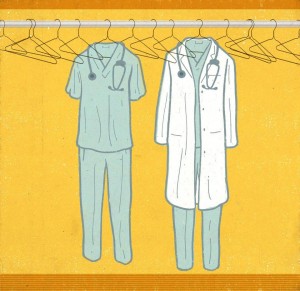October 23rd, 2013 by Dr. Val Jones in Health Tips, Opinion
1 Comment »
 I realize that my blog has been littered with depressing musings on healthcare lately, and so I thought I’d offer up one very positive and “actionable” suggestion for all you patients out there. In the midst of a broken system where your doctor is being pressured to spend more time with a computer than listening and examining you, where health insurance rates and co-pays are sky-rocketing, and where 1 in 5 patients have the wrong diagnosis… There is one “magic” question that you should be asking your physician(s):
I realize that my blog has been littered with depressing musings on healthcare lately, and so I thought I’d offer up one very positive and “actionable” suggestion for all you patients out there. In the midst of a broken system where your doctor is being pressured to spend more time with a computer than listening and examining you, where health insurance rates and co-pays are sky-rocketing, and where 1 in 5 patients have the wrong diagnosis… There is one “magic” question that you should be asking your physician(s):
“What else could this be?”
This very simple question about your condition/complaint can be extremely enlightening. Physicians are trained to develop extensive “differential diagnoses” (a list of all possible explanations for a set of signs and symptoms) but rarely have time to think past possibilities 1 through 3. That’s one of the reasons why so many patients have the wrong diagnosis – which is both costly in terms of medical bills, time, and pain and suffering.
There is a risk in asking this question – you don’t want to be over-tested for conditions that you are unlikely to have, of course. But I maintain that the cost/risk of living with the wrong diagnosis far exceeds the risk of additional testing to confirm the correct diagnosis. So my advice to patients is to keep this very important question in mind when you see your doctor for a new concern.
In addition to asking this question of your doctor, you can also ask it during a second opinion meeting with another physician. The good news is that these days you don’t even need to get a second opinion in person. I myself have been working with an online second-opinion service called eDocAmerica for several years. Those who sign up for the service can pick the brains of board-certified U.S. physicians on any subject, 24-7 via email (and in some states via phone). The cost is extraordinarily reasonable when provided by employers, and winds up being about one or two dollars per member per month.
If you have a complicated disease or condition (such as cancer) where experts may not all agree on the best treatment plan, a company called Best Doctors offers detailed chart reviews and second opinions from top specialists at academic centers. Again, this service is quite affordable and reasonable if the cost is spread among a group. Employers are able to pay a small fee per employee per month to enroll the entire company in the service.
So why don’t all employers offer these benefits? I suspect that part of the reason is lack of awareness that second opinion services exist, and the other part is tepid demand on the part of employees. So if you’d like to make sure that you’re not one of the five people who have the wrong diagnosis, why not raise the question with your HR department? Enrolling as an individual is also an option, and still as inexpensive as about thirty dollars a month.
My bottom line: make sure you ask your doctor the magic question at least once for every new concern that you have. And if you’re too shy to do it, or your doctor’s answer seems too short, then get a second opinion online or in person.
This one little question could save your life.
May 19th, 2013 by Dr. Val Jones in Opinion
2 Comments »

Image Credit: Dan Page, Boston Globe
What is the US going to do about our current and future primary care physician shortage? Many believe that the solution is to expand the scope of nursing practice, and license non-physicians (such as naturopaths) to practice medicine. In the face of scarcity, 17 states have licensed naturopaths to provide primary care and nurse-led, in-store pharmacy clinics are gaining popularity.
Studies have shown that nurse practitioners are as capable as physicians at treating common primary care complaints such as strep throat and headache. What studies have NOT shown is that nurse practitioners recognize and diagnose less common diseases with similar symptoms. What if the strep throat were throat cancer? What if the headache were meningitis? Substituting practitioners with half the training and experience of an MD comes at a price. And that price may include missed diagnoses, delay of appropriate treatment, and life threatening consequences.
But the lure of cost savings cannot be ignored. Nurses are paid less to practice primary care, so in theory we could save untold millions each year by having patients see nurses instead of doctors. That sounds good, but now nurse practitioners are lobbying to receive the same salary as MDs for their time. After all, they’re doing the same work, right? Never mind that everyone they treat must be squeezed into a limited set of diagnosis codes – when all you have is a hammer, then everything starts looking like a nail. “Poof” goes the savings, while care quality standards are permanently reduced by forced limitations on differential diagnoses.
A better solution would be to find ways to extend physician reach and expertise with telemedicine platforms, longer patient visit times, and by reducing their non-clinical practice burden. Nurses and ancillary providers are valued members of the clinical team who are dearly loved by patients and doctors alike, but they simply do not have enough training to be ruling out tens of thousands of rare diseases and conditions. This is why we need physicians at the helm of the clinical team – to make sure that patients are on the right treatment pathway.
Some nurses cry “prejudice” when physicians suggest that MDs provide better primary care. But we all know that knowledge and experience are a critical asset when lives are at stake. As the research results begin to roll in regarding better patient outcomes under the care of physicians versus nurse practitioners, common sense tells us that outsourcing primary care to the less qualified will have undesirable consequences for some. And if you choose to get your primary care from a naturopath or nurse, you’ d better hope that headache isn’t anything serious. Because a little savings now could cost you your life.
July 20th, 2011 by Lucy Hornstein, M.D. in Opinion
No Comments »

62-year-old black man with a two inch (that’s inch; not centimeter) lump under his left arm. It is determined that he needs to have it biopsied in order to tell for sure what it is. The differential diagnosis includes a simple reactive lymph node, lymphoma, leukemia, granuloma, sarcoidosis, and several other more esoteric entities, all of which require tissue for definitive pathologic diagnosis.
The dialogue:
Patient Who Will Not be Reassured: What is it, Doctor Dino?
Me: We won’t know for sure until we get the report from the biopsy.
PWWNBR: But what do you think it is?
Me: I have no idea. We have to see what the pathologist says.
PWWNBR: Could it be cancer?
Me: It could be any one of several different things. Yes, cancer could be one of them, but there’s no way of knowing without the biopsy.
PWWNBR: Dr. Dino, do I have cancer? Read more »
*This blog post was originally published at Musings of a Dinosaur*
March 31st, 2011 by Elaine Schattner, M.D. in Opinion
No Comments »

The Times ran an intriguing experiment on its Well blog yesterday: a medical problem-solving contest. The challenge, based on the story of a real girl who lives near Philadelphia, drew 1379 posted comments and closed this morning with publication of the answer.
Dr. Lisa Sanders, who moderated the piece, says today that the first submitted correct response came from a California physician; the second came from a Minnesota woman who is not a physician. Evidently she recognized the condition’s manifestations from her experience working with people who have it.
 The public contest – and even the concept of using the word “contest” – to solve a real person’s medical condition interests me a lot. This kind of puzzle is, as far as I know, unprecedented apart from the somewhat removed domains of doctors’ journals and on-line platforms intended for physicians, medical school problem-based learning cases, clinical pathological conferences (CPC’s) and fictional TV shows. Read more »
The public contest – and even the concept of using the word “contest” – to solve a real person’s medical condition interests me a lot. This kind of puzzle is, as far as I know, unprecedented apart from the somewhat removed domains of doctors’ journals and on-line platforms intended for physicians, medical school problem-based learning cases, clinical pathological conferences (CPC’s) and fictional TV shows. Read more »
*This blog post was originally published at Medical Lessons*
October 14th, 2010 by Toni Brayer, M.D. in Better Health Network, Health Tips
No Comments »

When patients and doctors communicate effectively, the patient has the best result. Not every doctor asks the critical question that can cinch a diagnosis. Yet good communication, coupled with good diagnostic skill can be worth more than $10,000 in tests and referrals to consultants.
You can help your doctor figure out what is going on by thinking and communicating like a physician. Whether you have a new problem or something that has been bothering you for a long time, here are some things that the doctor will want to know:
1. What are the symptoms? Be specific. Don’t just say “Sometimes I have a pain in my stomach.” Since more than 80 percent of health problems can be diagnosed based on information that you provide, make sure you can verbalize what you are feeling. Is it crampy? Does the pain come and go? Where is it located? Is it sharp or more like an ache? These specifics are giving information that your doctor can use as she thinks of the anatomy, physiology and causes of pain.
2. How long has it been going on? Try to be specific. “Awhile” doesn’t mean anything to a doctor. That could be two days or two years. Did it come on gradually or suddenly? There is a different cause for any symptom that is chronic (over several weeks) vs. sudden or acute. Did anything precede the symptoms? Travel, trauma, or life stress can point to different causes. Read more »
*This blog post was originally published at EverythingHealth*
 I realize that my blog has been littered with depressing musings on healthcare lately, and so I thought I’d offer up one very positive and “actionable” suggestion for all you patients out there. In the midst of a broken system where your doctor is being pressured to spend more time with a computer than listening and examining you, where health insurance rates and co-pays are sky-rocketing, and where 1 in 5 patients have the wrong diagnosis… There is one “magic” question that you should be asking your physician(s):
I realize that my blog has been littered with depressing musings on healthcare lately, and so I thought I’d offer up one very positive and “actionable” suggestion for all you patients out there. In the midst of a broken system where your doctor is being pressured to spend more time with a computer than listening and examining you, where health insurance rates and co-pays are sky-rocketing, and where 1 in 5 patients have the wrong diagnosis… There is one “magic” question that you should be asking your physician(s):
















